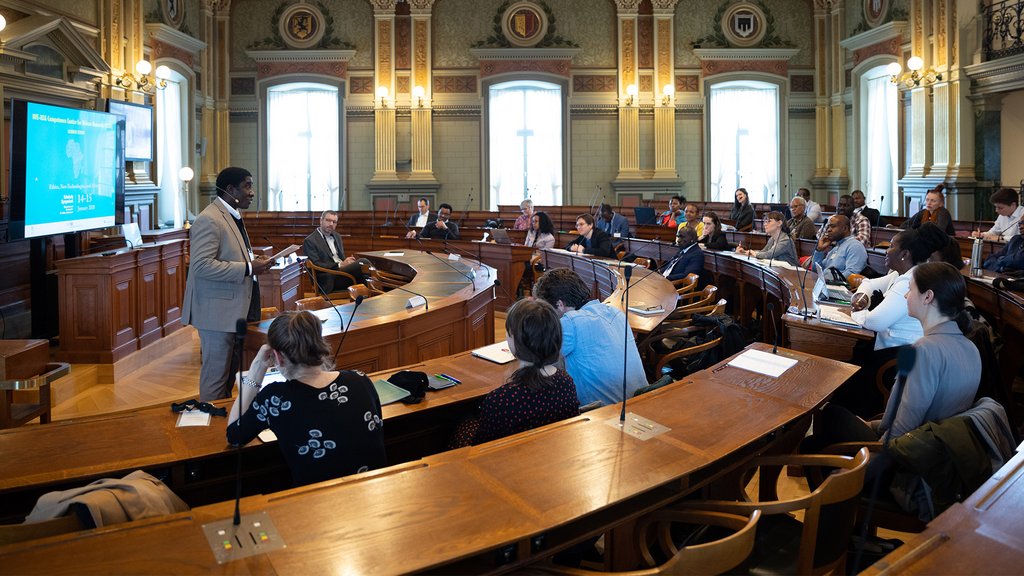Background - 20.01.2020 - 00:00
20 January 2020. "This is an extraordinary symposium for the whole of Switzerland." It was with these words that initiator Florian Wettstein, Professor of Business Ethics, started the launch of the Competence Centre for African Research (CCAR-HSG) in the chamber of St.Gallen’s cantonal parliament. Vice-President Ulrich Schmid went a step further and called Africa a “blind spot in Switzerland’s educational system”. This newly created platform would now counteract this.
Indeed, the potential of this Swiss-African cooperation soon became evident. Participants conducted lively discussions, exchanged different ideas, constantly in a spirit of friendly relations, whose importance was also emphasised by the co-initiator and head of the competence centre, Thierry Ngosso, in this address. He was pleased that the discourse about Africa could now increasingly be found at the University of St.Gallen, for it was not only Africa which should speak about Africa.
The narrow corridor between state and society
In the first keynote speech, Thierry Amougou from the Catholic University of Leuven explained the concept of the "narrow corridor", based on the eponymous book by Daron Acemoglu und James A. Robinson. The core of this theory is a balanced distribution of power between state and society. A bull’s eye. Amougou focused on different developments in Cameroon and the Democratic Republic of Congo, including digitalisation. He came to the conclusion that the power resulting from the latter benefited the state more strongly although the population also profited from it in everyday life. The subsequent discussion demonstrated convincingly why this dialogue created by the CCAR is so valuable.
A completely switched-off internet – what we regard as an unlikely nightmare is reality in some African countries. In fact it is up to the government in many places to curtail data traffic or to switch it off completely. Participants discussed the question as to whether any African country has reached the "narrow corridor" at all. One voice opined that it would probably only be in the power of the state to attain this target status. Amougou replied that society, on its part, was indeed also able to work towards it; the existing power would only have to be organised accordingly and taken to the outside world, he explained.
African diversity and lively discussions
Besides four keynote speeches, eight panel discussions were also staged. Their focus ranged from technology and ethics to various African countries. In this discussion-oriented format, the diversity that exists within Africa was palpable. It was exciting to listen to debates among invited representatives which could have taken place in a similar way among residents of different European countries.
In the first two panel discussions, participants talked about the effect of technology on culture, with a special focus on information and communication technology, as well as artificial intelligence. Ndidi Nwaneri from Lagos State University emphasised that cultures were dynamic: if there was change, they usually adapted. If they did not, they died and were replaced. This was consistent with human nature. Nwaneri also explained the process of psychological indigenisation, i.e. the absorption of "foreign" elements. In this respect, changing possessions played a greater part than, say, moving house. Thus the introduction of new technologies and devices made a great social impact, which had to be taken into consideration.
In the panel discussion chaired by Denis-Ghislain Mbessa from the University of Yaoundé I, the participants intensively discussed the role of western culture in Africa. Mbessa would like to make use of modern technologies while resisting encroaching westernisation at the same time. One participant spotted a contradiction here and preferred to speak of integration rather than resistance or even rejection. After all, most of these technologies had originated in western cultures and were moulded by them. The participants agreed on the important role of education in the use of the technologies.
Existence thanks to SIM cards
A further memorable debating point concerned SIM cards. What is a matter of course for us is much more so elsewhere: "It was only thanks to SIM cards that some people began to exist," argued one participant from Nigeria. In fact, the SIM card has the function of an address in many places. When people buy and use a SIM card, they do not have to provide their personal data in every country and with every provider. Added to this, the possession of several SIM cards or changes owing to theft were widespread, as a participant from South Africa mentioned. This lack of identifiability made data traffic monitoring more difficult. According to a further voice, the identification of all the people was a central step that had to be taken everywhere in Africa in order to make progress.
Positive feedback and satisfied organisers
The launching event of the CCAR-HSG has whetted people’s appetite for more. Participants made enthusiastic use of the platform they had been offered. The organisers were equally pleased. Florian Wettstein said: "It was a highly inspiring launching symposium at a very high level and with many animated conversations and discussions. We perceived a great deal of interest and support for the competence centre – particularly also from our guests from various African countries."
Thomas Tarantini is studying Business Innovation (MBI) and Business Journalism.
More articles from the same category
Discover our special topics
